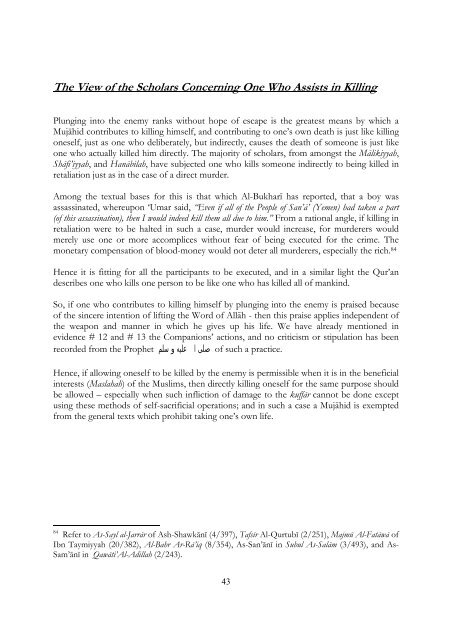the-islamic-ruling-on-the-permissibility-of-self-sacrificial-operations-suicide-or-martyrdom
the-islamic-ruling-on-the-permissibility-of-self-sacrificial-operations-suicide-or-martyrdom
the-islamic-ruling-on-the-permissibility-of-self-sacrificial-operations-suicide-or-martyrdom
Create successful ePaper yourself
Turn your PDF publications into a flip-book with our unique Google optimized e-Paper software.
The View <strong>of</strong> <str<strong>on</strong>g>the</str<strong>on</strong>g> Scholars C<strong>on</strong>cerning One Who Assists in Killing<br />
Plunging into <str<strong>on</strong>g>the</str<strong>on</strong>g> enemy ranks without hope <strong>of</strong> escape is <str<strong>on</strong>g>the</str<strong>on</strong>g> greatest means by which a<br />
Mujāhid c<strong>on</strong>tributes to killing him<strong>self</strong>, and c<strong>on</strong>tributing to <strong>on</strong>e’s own death is just like killing<br />
<strong>on</strong>e<strong>self</strong>, just as <strong>on</strong>e who deliberately, but indirectly, causes <str<strong>on</strong>g>the</str<strong>on</strong>g> death <strong>of</strong> some<strong>on</strong>e is just like<br />
<strong>on</strong>e who actually killed him directly. The maj<strong>or</strong>ity <strong>of</strong> scholars, from am<strong>on</strong>gst <str<strong>on</strong>g>the</str<strong>on</strong>g> Mālikiyyah,<br />
Shāfi’iyyah, and Hanābilah, have subjected <strong>on</strong>e who kills some<strong>on</strong>e indirectly to being killed in<br />
retaliati<strong>on</strong> just as in <str<strong>on</strong>g>the</str<strong>on</strong>g> case <strong>of</strong> a direct murder.<br />
Am<strong>on</strong>g <str<strong>on</strong>g>the</str<strong>on</strong>g> textual bases f<strong>or</strong> this is that which Al-Bukharī has rep<strong>or</strong>ted, that a boy was<br />
assassinated, whereup<strong>on</strong> ‘Umar said, “Even if all <strong>of</strong> <str<strong>on</strong>g>the</str<strong>on</strong>g> People <strong>of</strong> San’ā’ (Yemen) had taken a part<br />
(<strong>of</strong> this assassinati<strong>on</strong>), <str<strong>on</strong>g>the</str<strong>on</strong>g>n I would indeed kill <str<strong>on</strong>g>the</str<strong>on</strong>g>m all due to him.” From a rati<strong>on</strong>al angle, if killing in<br />
retaliati<strong>on</strong> were to be halted in such a case, murder would increase, f<strong>or</strong> murderers would<br />
merely use <strong>on</strong>e <strong>or</strong> m<strong>or</strong>e accomplices without fear <strong>of</strong> being executed f<strong>or</strong> <str<strong>on</strong>g>the</str<strong>on</strong>g> crime. The<br />
m<strong>on</strong>etary compensati<strong>on</strong> <strong>of</strong> blood-m<strong>on</strong>ey would not deter all murderers, especially <str<strong>on</strong>g>the</str<strong>on</strong>g> rich. 84<br />
Hence it is fitting f<strong>or</strong> all <str<strong>on</strong>g>the</str<strong>on</strong>g> participants to be executed, and in a similar light <str<strong>on</strong>g>the</str<strong>on</strong>g> Qur’an<br />
describes <strong>on</strong>e who kills <strong>on</strong>e pers<strong>on</strong> to be like <strong>on</strong>e who has killed all <strong>of</strong> mankind.<br />
So, if <strong>on</strong>e who c<strong>on</strong>tributes to killing him<strong>self</strong> by plunging into <str<strong>on</strong>g>the</str<strong>on</strong>g> enemy is praised because<br />
<strong>of</strong> <str<strong>on</strong>g>the</str<strong>on</strong>g> sincere intenti<strong>on</strong> <strong>of</strong> lifting <str<strong>on</strong>g>the</str<strong>on</strong>g> W<strong>or</strong>d <strong>of</strong> Allāh - <str<strong>on</strong>g>the</str<strong>on</strong>g>n this praise applies independent <strong>of</strong><br />
<str<strong>on</strong>g>the</str<strong>on</strong>g> weap<strong>on</strong> and manner in which he gives up his life. We have already menti<strong>on</strong>ed in<br />
evidence # 12 and # 13 <str<strong>on</strong>g>the</str<strong>on</strong>g> Compani<strong>on</strong>s’ acti<strong>on</strong>s, and no criticism <strong>or</strong> stipulati<strong>on</strong> has been<br />
rec<strong>or</strong>ded from <str<strong>on</strong>g>the</str<strong>on</strong>g> Prophet صلى االله عليه و سلم <strong>of</strong> such a practice.<br />
Hence, if allowing <strong>on</strong>e<strong>self</strong> to be killed by <str<strong>on</strong>g>the</str<strong>on</strong>g> enemy is permissible when it is in <str<strong>on</strong>g>the</str<strong>on</strong>g> beneficial<br />
interests (Maslahah) <strong>of</strong> <str<strong>on</strong>g>the</str<strong>on</strong>g> Muslims, <str<strong>on</strong>g>the</str<strong>on</strong>g>n directly killing <strong>on</strong>e<strong>self</strong> f<strong>or</strong> <str<strong>on</strong>g>the</str<strong>on</strong>g> same purpose should<br />
be allowed – especially when such inflicti<strong>on</strong> <strong>of</strong> damage to <str<strong>on</strong>g>the</str<strong>on</strong>g> kuffār cannot be d<strong>on</strong>e except<br />
using <str<strong>on</strong>g>the</str<strong>on</strong>g>se methods <strong>of</strong> <strong>self</strong>-<strong>sacrificial</strong> operati<strong>on</strong>s; and in such a case a Mujāhid is exempted<br />
from <str<strong>on</strong>g>the</str<strong>on</strong>g> general texts which prohibit taking <strong>on</strong>e’s own life.<br />
84 Refer to As-Sayl al-Jarrār <strong>of</strong> Ash-Shawkānī (4/397), Tafsīr Al-Qurtubī (2/251), Majmū Al-Fatāwā <strong>of</strong><br />
Ibn Taymiyyah (20/382), Al-Bahr Ar-Rā’iq (8/354), As-San’ānī in Subul As-Salām (3/493), and As-<br />
Sam’ānī in Qawāti’Al-Adillah (2/243).<br />
43


